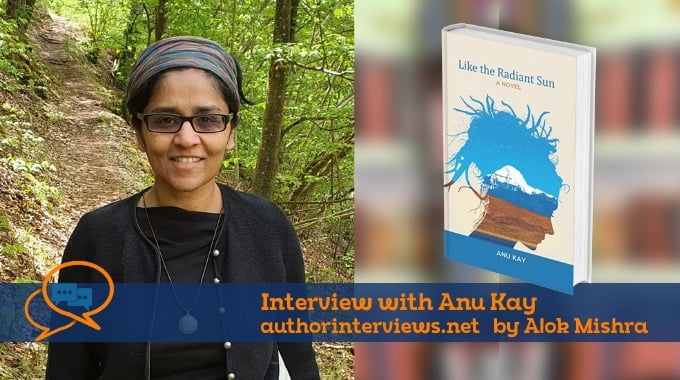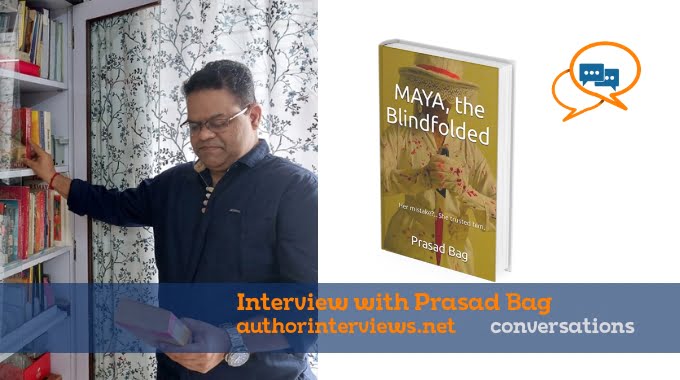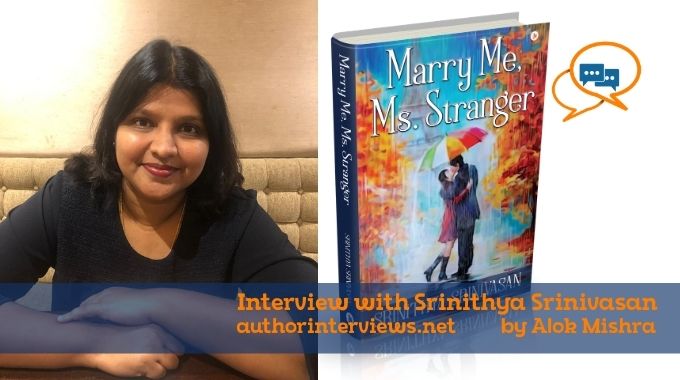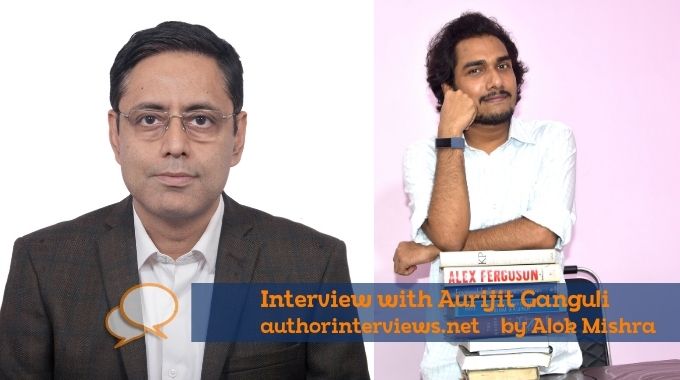Prasad Bag is a novelist who made his debut with the publication of Maya, The…

Interview with Anu Kay – Novelist
Anu Kay started her writing journey with her debut novel, Like the Radiant Sun. She writes about her life and the moments that matter to her. She also takes interest in writing about history, human existence, secrets and mysteries of our world. Writing gives her hope to continue, in her own words. Anu Kay has studied creative writing and journalism at the University of Stuttgart, Germany. Before she started writing, she worked as a software developer and analyst for various companies. Anu was born in Bangalore, India. She has lived in several places in the Middle East and Europe and currently resides in Germany. Below is an interview with Anu Kay on the successful run of her debut novel, Like the Radiant Sun.
Alok Mishra: Anu, what genre you would like to associate with your book? History, mythology, fantasy or contemporary fiction?
Anu Kay: I believe ‘Like the Radiant Sun’ is contemporary fiction, a modern-day mystery, a cross-genre of magical realism and historical fiction. It is a story inspired by the Vedas and Indian epics. The title ‘Like the Radiant Sun’ is a quote from Rigveda.
Alok Mishra: What was the key inspiration behind the manuscript “Marma Kala” in your novel Like the Radiant Sun?
Anu Kay: Isn’t it fascinating that thousands of years ago our ancestors were well advanced in understanding the human body and mind? Through Marma Kala, Kalaripayattu and Ayurveda, our ancestors knew how a human body functions and what it is capable of. Modern science has accepted these age-old concepts. I had to write about India’s rich history and its culture, which even today puzzles people in the West.
AM: What’s the story behind the mysterious and attractive character of Neela?
AK: In India, we are brought up with stories of gods and goddesses. We are told that they are everywhere and they reveal to us in different shapes and forms. They test us and if we pass the test, they give us a boon. As a child, I used to read comic books where gods and goddesses were beautiful, mysterious, charming and playful. The Rigveda is full of praise for Rudra (who later became Shiva). He has beautiful eyes and lips; he wears braided hair. His form is dazzling, he shines like the radiant sun, like gold. According to the Vedas, irrespective of gender, we all have male and female attributes within us. Understanding ourselves, our bodies, leads us to harmony, and balanced life. In the book ‘Like the Radiant Sun’, Neela is the female power of Shiva.
AM: The novel takes the readers into the past and present at certain points. How did you decide on those places from the past like Nalanda University, the burning libraries, and Kashi?
AK: We had Gurukulas and universities like Nalanda and Taxila long before the colonial era. Since the book ‘Like the Radiant Sun’ is based on an ancient Sanskrit manuscript – The Marma Kala, it is impossible to ignore the ancient body of wisdom of historical India. When we talk about Ashoka, we need to include Nalanda University. When we write about Shiva, we cannot ignore a place like Varanasi. The burning library not only depicts lost books, but also the many invasions India had to face. Scholars believe that only 8% of the Vedas, as in written scripture, has been found and the rest is lost in time.
AM: What makes your novel unique according to you? Readers have praised your work for many reasons. What reason do you find that makes your novel unique?
AK: I believe ‘Like the Radiant Sun’ is the only novel inspired by the Vedas. It treats characters like real people, not fantasy or cartoon figures. The story depicts ‘it could have been like this during the Vedic Period’. I believe, the Vedas are like history books and that the Vedic people really existed. ‘Like the Radiant Sun’ portrays the spirit of India, the spirit of Indian people.
AM: In any good book we read, you may have read many, we find a constant struggle between the good and the evil. In your novel, there is a struggle for the possession of a manuscript. What does that manuscript mean in the larger context, more than a book?
AK: Good question. The Marma Kala in a larger context means knowledge, supremacy, power to win, to be the best. It is in a way materialistic. At the same time, the Marma Kala forces us not to be greedy and selfish. If we want power, we must work on it, be disciplined, earn it and deserve it.
AM: There is a debate among intellectuals on myth and history. Where do you stand? Are Indian myths only hear-say stories, or do they have some concrete base?
AK: Defining history is hardly easier than defining myth. A historian would call something a myth if he/she does not find written proof or archaeological evidence. One can argue, that if no writings or artefacts were found, it does not mean the thing did not exist. If the human eye cannot see certain things like atoms, if our human mind cannot perceive them and our fingers cannot touch them, it doesn’t mean they don’t exist. In Geneva, Switzerland, at the European Organization of Nuclear Research CERN, they have a statue of Shiva Nataraja symbolizing his cosmic dance of creation and destruction. According to the Vedas, the cosmic dance of Shiva represents the rhythm of the universe – the Big Bang, the cosmos, the revolution and the rotation of planets, the micro cosmos within our human body, the macro cosmos as in the mighty galaxy, the rhythmic human heartbeat, the cyclic nature of humans, the ticking of time…
AM: What will you do next? Write more in the same theme set-up or try something new?
AK: I have more books on the Vedas, ancient manuscripts, ancient wisdom and history. Some of them are in the early draft stage, I hope they will be completed soon and published as well.
Living in Europe, I realised how India can give its spiritual tradition – the inner journey – to the world, as opposed to the more outer focussed Europe. It would be a great complement to the creation of new world culture. I feel the need to bring to light and make available what our ancestors understood to a broader audience, so that not just the scholars, but we all can profit from their profound wisdom. This is my call and I made it my mission to tell real-life stories from the past and to re-live the Vedic times. Let us together make this a beginning of the renaissance of Vedic Times in modern days.
Please check my website www.anu-kay.com for updates.
AM: Do you have some favourite authors? What kind of books do you prefer reading in leisure? And while writing yourself, do you read something by other writers?
AK: I have favourite books rather than favourite authors. ‘The Last of the Mohicans’ by James Fenimore Cooper, ‘Perfume’ by Patrick Suskind, ‘The Name of the Rose’ by Umberto Eco, ‘Mahabharata’ by Vyasa and ‘Shakuntala’ by Kalidasa to name a few.
Author Interviews thanks Anu Kay for your time answering all these questions, Anu.




This Post Has 0 Comments